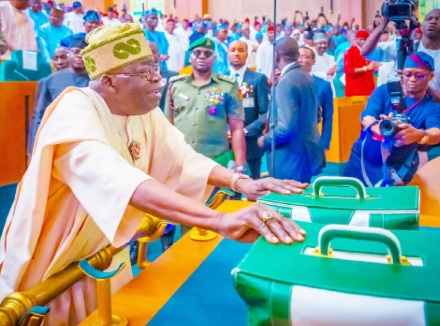How N6.9 Trillion in “Padded” Projects Found Its Way into Nigeria’s 2025 Budget.
- Home
- How N6.9 Trillion in “Padded” Projects Found Its Way into Nigeria’s 2025 Budget.

- 21 May, 2025
- Faith Kegh
- comments off
How N6.9 Trillion in “Padded” Projects Found Its Way into Nigeria’s 2025 Budget.
A recent report by civic-tech organization BudgIT has shed light on serious concerns regarding Nigeria’s 2025 national budget. According to their findings, the National Assembly inserted over 11,000 projects valued at a staggering N6.93 trillion—without sufficient justification or alignment with national priorities.
This amount represents 12.5% of the N54.99 trillion budget that President Bola Ahmed Tinubu signed into law in February 2025.
How We Got Here
President Tinubu first presented a N49.7 trillion budget proposal to the National Assembly in December 2024, dubbed the “Budget of Restoration.” He later requested an upward review to N54.2 trillion, citing increased revenue from key federal agencies. However, by the time lawmakers were done, the final figure rose to N54.99 trillion.
BudgIT’s analysis reveals that much of the increase came from additional projects quietly added by legislators—some with questionable relevance or no connection to the ministries assigned to implement them.
What BudgIT Found
BudgIT’s 18-page report lists thousands of inserted projects, including:
* **238 projects over N5 billion each**, totaling N2.29 trillion
* **984 projects worth N1.71 trillion**
* **1,119 projects between N500 million and N1 billion**, totaling N641.38 billion
* **Streetlights** (1,477 projects) costing N393.29 billion
* **Boreholes** (538 projects) worth N114.53 billion
* **ICT-related projects** totaling over N500 billion
* **N6.74 billion** allocated for the “empowerment of traditional rulers”
Notably, 39% of the insertions—worth N1.72 trillion—were directed at the Ministry of Agriculture, drastically inflating its capital budget from N242.5 billion to nearly N2 trillion.
Even agencies with no mandate for such activities were saddled with irrelevant projects. For example, the National Centre for Agricultural Mechanisation in Ilorin was assigned N400 million for scholarships in Bayelsa State—far outside its operational scope.
A Pattern of Budget Padding
This isn’t a new problem. Since Nigeria’s return to democracy in 1999, presidents from Obasanjo to Buhari have publicly clashed with the National Assembly over budget manipulation.
In 2016, Abdulmumin Jibrin, then House Committee Chair on Appropriations, exposed a major padding scandal involving N40 billion in inserted projects. In 2024, Senator Abdul Ningi alleged that N3.7 trillion could not be traced in the approved budget, reigniting public outcry over legislative fiscal misconduct.
Expert Reactions
Emeritus Professor Ndubisi Nwokoma called the practice “unsustainable” and a sign of systemic corruption. Dr. Aminu Hayatu, a political scientist, said legislators are overstepping their constitutional role by executing rather than overseeing projects.
He added that many of the inserted projects are untraceable or poorly executed, serving as tools for looting public funds.
Professor Abubakar Kari of the University of Abuja emphasized the need for legal clarification on whether lawmakers have the authority to insert projects. He condemned the practice as undermining governance and public trust.
Civil Society Speaks Out
Civil society leaders, including Auwal Rafsanjani of CISLAC and Toyin Raheem of CACOBAG, described the insertions as legalized theft and a threat to Nigeria’s economic stability. They urged citizens to demand accountability and transparency.
Rafsanjani noted that many of the so-called constituency projects are not tracked, monitored, or aligned with real community needs. Instead, they enrich a few at the expense of millions.
What Needs to Change
BudgIT has called on President Tinubu to assert stronger executive oversight and reform the budget process in collaboration with lawmakers. Without such changes, Nigeria’s budget will continue to reflect political patronage over national development.
The calls for transparency, civic engagement, and legal accountability are growing louder. Whether or not real reform follows remains to be seen.
Conclusion
Nigeria’s budgeting process is under increasing scrutiny. With trillions of naira being spent on potentially unverified or unnecessary projects, the demand for transparency and accountability has never been more urgent. Citizens, civil society, and ethical leaders must unite to ensure public funds are used for the good of all—not the gain of a few.

Content & Editorial Manager – Leads the creation, review, and publication of high-quality news and media content. She ensures that all editorial work reflects the organization’s standards of accuracy, professionalism, and relevance, while also engaging and informing the audience.
As the key driver of TokinPoint Media LTD’s editorial voice, the manager oversees content planning, assigns tasks to writers or editors, enforces deadlines, and ensures consistency across all platforms. She also plays a strategic role in aligning content with audience interests and search engine optimization (SEO) best practices.
Discover more from TokinPoint
Subscribe to get the latest posts sent to your email.
- Share
Faith Kegh
Content & Editorial Manager - Leads the creation, review, and publication of high-quality news and media content. She ensures that all editorial work reflects the organization’s standards of accuracy, professionalism, and relevance, while also engaging and informing the audience.
As the key driver of TokinPoint Media LTD's editorial voice, the manager oversees content planning, assigns tasks to writers or editors, enforces deadlines, and ensures consistency across all platforms. She also plays a strategic role in aligning content with audience interests and search engine optimization (SEO) best practices.
